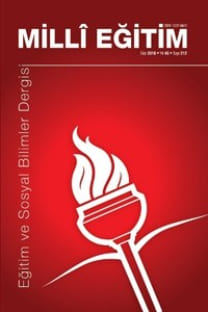İLKÖĞRETİM MATEMATİK ÖĞRETMEN ADAYLARININ İSTATİSTİK DERSİNİN İSLENİŞİNE, ÖĞRENİLMESİNE VE DEĞERLENDİRMESİNE İLİŞKİN İNANÇ VE ÖNERİLERİ
Bu kesitsel tarama çalışmasında, ilköğretim matematik öğretmen adaylarının istatistik dersinin islenişi, öğrenilmesi ve değerlendirilmesi ile ilgili inanç ve önerileri araştırılmıştır. Çalışmaya Türkiye’deki iki devlet üniversitesinin İlköğretim Matematik Öğretmenliği programında öğrenim gören n=160 öğretmen adayı katılmıştır. Veri toplama aracı olarak, İstatistik Öğretme Envanterinin uyarlanmış versiyonunun inançlar ile ilgili bölümü kullanılmıştır. Türkçeye uyarlaması yapılan İstatistik Öğretme Envanterindeki her bir maddeye öğretmen adaylarının verdikleri tepkiler analiz edilerek, frekans ve yüzde değerleri ile sunulmuştur. Öğretmen adaylarının “İstatistik dersinin nasıl işlenmesini isterdiniz?” sorusuna verdikleri yazılı yanıtlar üzerinde iki araştırmacı tarafından içerik analizi işlemi gerçekleştirilmiş ve araştırmacılar arasındaki uyum indeksi .93 olarak bulunmuştur. Bu çalışmanın katılımcıları, istatistik derslerinin kâğıt-kalem hesaplamaları yoluyla yürütüldüğüne, istatistiksel kavramların ve kuralların altında yatan anlama temas edilmediğine işaret etmişlerdir. Ayrıca çoğu öğretmen adayı, öğrenci başarısının biçimlendirici ve alternatif ölçme araçları kullanılarak değerlendirilmesi gerektiği görüşünde birleşmişlerdir. Benzer çalışmalar farklı programlarda öğrenim gören öğrencilerle de yürütülebilir. Ayrıca öğretim elemanlarının istatistik dersini öğretim biçimleri gözlemlenerek, öğretim biçimi ile öğrenci beklentileri arasındaki ilişki incelenebilir.
PROSPECTIVE PRIMARY SCHOOL MATHEMATICS TEACHERS' BELIEF AND SUGGESTIONS OF THE TEACHING, LEARNING AND ASSESSMENT OF STATISTICS
In this cross-sectional survey study, prospective primary school mathematics teachers’ beliefs and suggestions of the teaching, learning and assessment of statistics were explored. One hundred and sixty (n=160) prospective teachers, who study at two public universities’ department of primary school mathematics education in Turkey, participated in this study. As a data collection tool, the belief section of Revised Statistics Teaching Inventory was used. Prospective teachers’ responses to the items of this questionnaire being adapted to Turkish were analysed and presented as frequencies and percentages. A content analysis of prospective teachers' answers to the question of “How should statistics courses to be taught?” were conducted by two researchers, and interrater reliability between them was found to be .93. The participants of this study expressed that statistics courses involved a series of calculations by hand, and their lecturers did not focus on the conceptual understanding of definitions and procedures. Additionally, many participants indicated that formative assessment and alternative assessment tools should be implemented to assess students’ progress in statistics classrooms. Similar studies can be conducted with students studying in different departments. Furthermore, the relationship between the teaching practice of statistics lecturers and students’ expectations can be explored by observing statistics classrooms.
___
- Aydın, S. (2016). Using Excel in teacher education for sustainability. Journal of Teacher Education for Sustainability, 18(2), 89–104. doi:10/ggvng7
